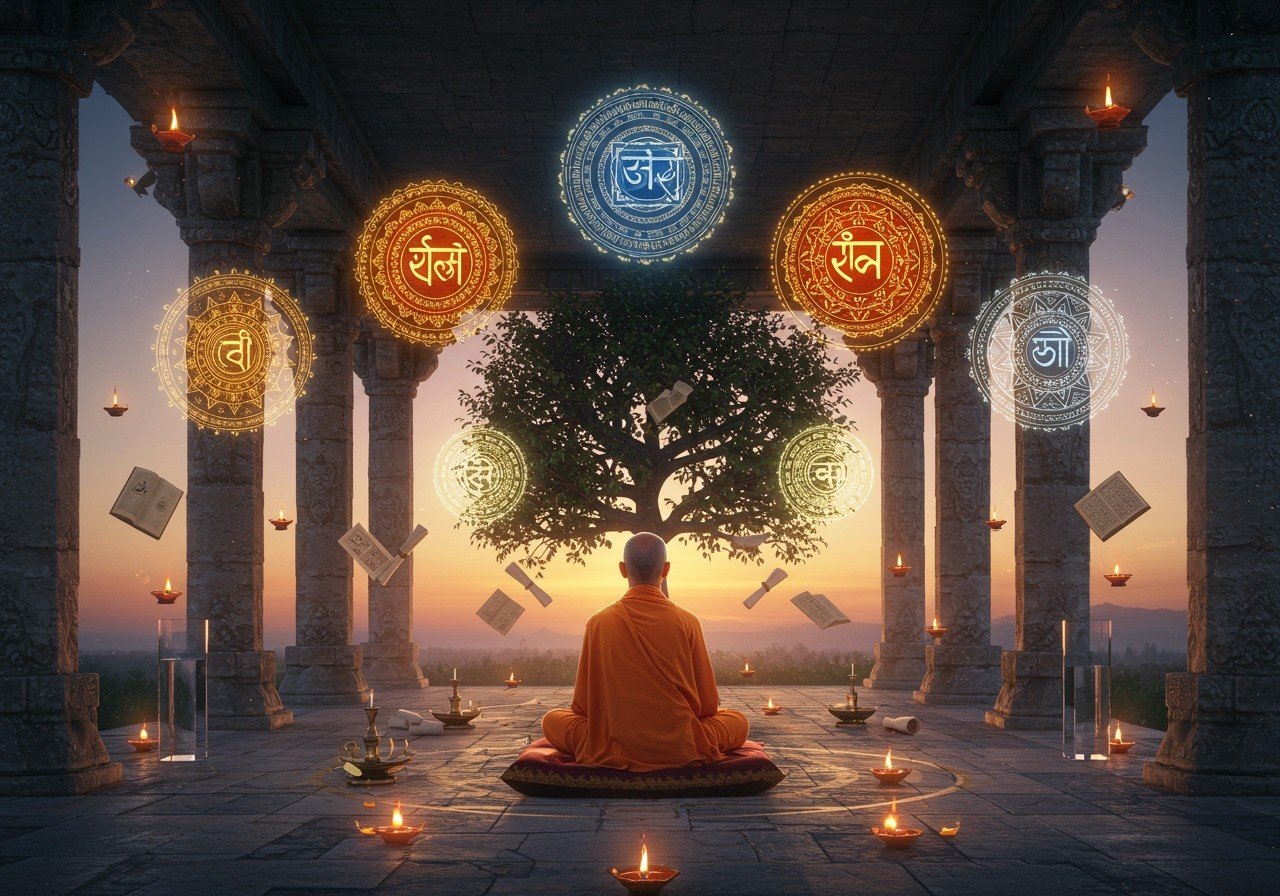
Indian philosophy, a profound and ancient field of thought, has shaped India’s cultural and spiritual landscape for millennia. This intricate tapestry of traditions and schools offers unique perspectives on life, existence, and the pursuit of truth. This guide provides an introduction to Indian philosophy, offering insights into its core concepts, aims, and diverse schools of thought.
What is Indian Philosophy?
Indian philosophy encompasses a range of systems developed by civilizations of the Indian subcontinent. These include orthodox schools (āstika) such as Nyāya, Vaiśeṣika, Sāṃkhya, Yoga, Pūrva-Mīmāṃsā, and Uttara-Mīmāṃsā (Vedānta), and unorthodox systems (nāstika) such as Buddhism, Jainism, and Cārvāka. It originated in the Vedic period (circa 1500-500 BCE), with the Vedas and Upanishads serving as foundational texts. Let’s explore the six classical schools, each with its unique approach:
- Nyāya: This school focuses on epistemology, logic, and the methods for acquiring valid knowledge. It emphasizes the importance of reasoning and critical thinking in understanding reality.
- Vaiśeṣika: Vaiśeṣika delves into metaphysics and cosmology, exploring the nature of the universe and its constituent elements. It proposes an atomistic theory of reality.
- Sāṃkhya: Sāṃkhya explores the dualistic nature of reality, distinguishing between consciousness (puruṣa) and matter (prakṛti). It explains the evolution of the universe and the concept of liberation.
- Yoga: The Yoga school provides practical methods for achieving liberation through physical and mental disciplines. It emphasizes practices like meditation, breath control, and ethical conduct.
- Pūrva-Mīmāṃsā: This school focuses on the interpretation of Vedic scriptures, particularly the Brahmanas and Samhitas, and the correct performance of rituals.
- Uttara-Mīmāṃsā (Vedānta): Vedānta explores the nature of ultimate reality (Brahman) and the relationship between the individual self (Atman) and Brahman. It emphasizes the concept of non-dualism.
Preserved primarily through oral tradition, Indian philosophy owes much to key figures like Vyasa, Patanjali, and Adi Shankaracharya. The epics Mahabharata and Ramayana also contain philosophical teachings, weaving them into narratives of gods, heroes, and moral dilemmas. Indian philosophy’s influence extends deeply into India’s religion, art, literature, and daily life.
Understanding Darshana in Indian Philosophy
The term “Darshana” translates to “seeing” or “viewpoint.” It refers to the different schools of thought within Indian philosophy. Each Darshana offers unique insights and perspectives:
- Nyāya: Emphasizes logic and reasoning as tools for understanding reality and attaining true knowledge. It offers a systematic approach to epistemology.
- Vaiśeṣika: Explores the nature of the universe through its atomistic theory, categorizing and analyzing the fundamental elements of reality. This provides a framework for understanding the physical world.
- Sāṃkhya: Provides a framework for understanding the dualistic nature of reality, differentiating between consciousness and matter, and explaining the process of creation and the path to liberation.
- Yoga: Offers practical techniques and disciplines for achieving liberation through self-realization and the control of mental processes. It emphasizes the integration of mind, body, and spirit.
- Mīmāṃsā: Focuses on the interpretation of Vedic scriptures and the performance of rituals, providing a framework for understanding the nature of dharma and karma.
- Vedānta: Delves into the spiritual aspects of existence, exploring the nature of ultimate reality and the relationship between the individual self and the divine. It emphasizes the pursuit of moksha (liberation).
These Darshanas grapple with fundamental questions about reality, the self, consciousness, and liberation. They sometimes complement, sometimes contradict each other, showcasing the rich diversity of Indian thought. Historical debates and commentaries have shaped their evolution, and they continue to be relevant in contemporary philosophical and spiritual discussions.
The Aim of Indian Philosophy
The central aim of Indian philosophy is to understand the nature of reality and achieve moksha (liberation) from the cycle of birth and death (samsara). Moksha signifies freedom from ignorance (avidya) and suffering (dukkha). Different schools propose various paths to moksha:
- Jnana Yoga (Path of Knowledge): Emphasizes understanding the true nature of reality through study, reflection, and self-inquiry. This path involves gaining wisdom and insight.
- Bhakti Yoga (Path of Devotion): Focuses on cultivating love and surrender to a divine being. This path involves developing a deep personal relationship with the divine.
- Karma Yoga (Path of Action): Involves performing one’s duties without attachment to the outcomes. This path emphasizes selfless action and dedication to duty.
Ethical conduct (dharma) and self-discipline are crucial for attaining liberation. Self-realization and inner transformation are key aspects of this quest. Indian philosophy takes a holistic approach, integrating the physical, mental, and spiritual dimensions of human existence. It addresses contemporary issues such as mental well-being, ethical living, and finding meaning in life.
Poojn.in: Supporting Your Journey into Indian Philosophy
Poojn.in, India’s leading online store for cultural and spiritual goods, offers a wide selection of products to support your exploration of Indian philosophy. Enhance your understanding and practice with these offerings:
- Sacred Texts and Books: Explore a curated collection of Vedas, Upanishads, Bhagavad Gita with commentaries, and other philosophical texts in Sanskrit and English. Deepen your knowledge with authoritative interpretations and translations.
- Meditation and Study Supplies: Create a conducive environment for contemplation and study. Find traditional meditation asanas, book stands, and prayer beads (japa malas) to enhance your practice.
- Ritual Items for Philosophical Practices: Discover pure copper and brass items for Vedic rituals, incense, and dhoop to create a serene atmosphere, and traditional lamps for contemplation. Browse our collection to find the perfect tools for your practice.
Conclusion
Indian philosophy offers a wealth of wisdom and diverse paths for understanding life’s complexities and achieving liberation. By integrating logic, spirituality, and practical methods for inner transformation, it provides profound insights into the nature of reality, guiding individuals towards self-realization. Embrace the teachings of these ancient traditions and discover the transformative impact they can have on your life’s journey.


